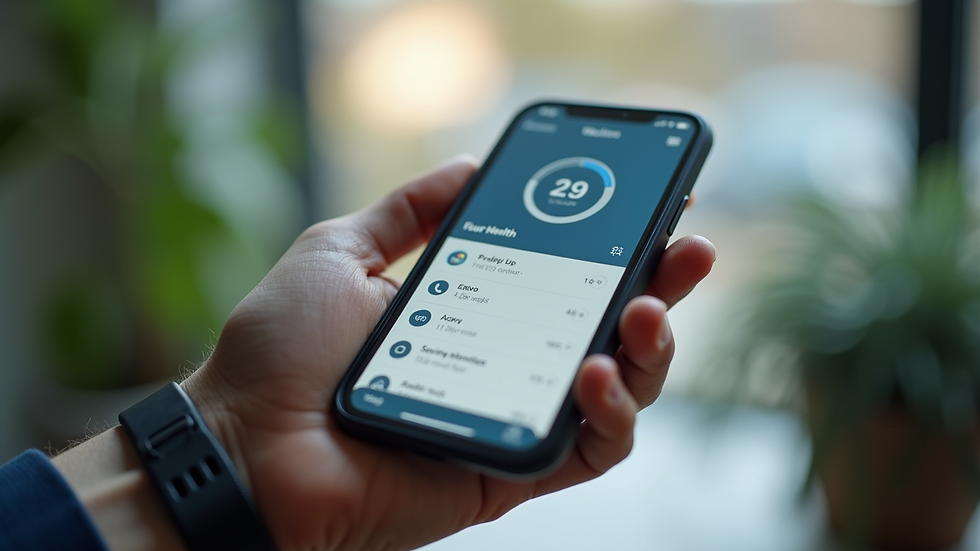Transforming Healthcare with Afya Safi
- Clifford Omuyoma

- Oct 13, 2025
- 4 min read
Healthcare in Kenya is evolving rapidly. Technology is no longer a luxury but a necessity. You might wonder, how can digital tools improve healthcare delivery? How can they make services more accessible, affordable and efficient? The answer lies in embracing digital health innovation Kenya is witnessing today. One standout example is the Afya Safi initiative, a game-changer in the healthcare landscape.
The Rise of Digital Health Innovation Kenya
Digital health innovation Kenya is not just a buzzword; it is a movement reshaping how healthcare is accessed and managed. From remote consultations to electronic health records, technology is bridging gaps that once seemed insurmountable.
Why is this important? Because Kenya’s population is growing, and so are the demands on its healthcare system. Traditional methods can no longer keep up. Digital solutions offer speed, accuracy, and reach. They empower healthcare providers to deliver better care and patients to take control of their health.
Consider mobile health apps that remind patients to take medication or telemedicine platforms connecting rural patients with urban specialists. These innovations reduce travel time, cut costs, and improve outcomes. They also help track disease outbreaks and manage health data securely.

The government and private sector are investing heavily in digital health. This includes infrastructure, training, and partnerships. The goal is clear: to create a sustainable, scalable healthcare system that serves every Kenyan.
How Afya Safi is Leading the Digital Health Revolution
Afya Safi is more than a platform; it is a comprehensive digital health ecosystem. It integrates various services to streamline healthcare delivery. From patient registration to diagnostics and treatment follow-up, Afya Safi covers it all.
What makes Afya Safi unique? Its user-friendly interface and wide accessibility. Whether you are a healthcare provider or a patient, the platform simplifies complex processes. It supports electronic medical records, appointment scheduling, and real-time health monitoring.
For healthcare providers, Afya Safi offers tools to manage patient data securely and efficiently. It reduces paperwork and minimizes errors. For patients, it means faster service, better communication, and personalized care.
The platform also supports health education and awareness campaigns. It sends timely alerts and health tips, helping users stay informed and proactive about their health.

Moreover, Afya Safi fosters collaboration among healthcare stakeholders. It connects clinics, hospitals, pharmacies, and labs, creating a seamless network. This integration improves resource allocation and enhances service delivery.
If you want to explore this further, check out the afya safi digital health platform for detailed insights and updates.
What is Zana Hub in Kenya?
Zana Hub is another vital component of Kenya’s digital health landscape. It is a community-driven health initiative that complements platforms like Afya Safi. Zana Hub focuses on grassroots engagement, empowering local communities to participate actively in health management.
How does Zana Hub work? It leverages mobile technology to collect health data from community health workers and residents. This data helps identify health trends, outbreaks, and service gaps quickly.
Zana Hub also promotes health education through SMS campaigns and interactive voice responses. It targets common health issues such as maternal health, infectious diseases, and nutrition.
By involving communities directly, Zana Hub ensures that health interventions are relevant and effective. It builds trust and encourages preventive care, reducing the burden on healthcare facilities.

Together, Afya Safi and Zana Hub represent a powerful synergy. They combine technology with community engagement to transform healthcare delivery from the ground up.
Practical Benefits for Businesses, Farmers, and Students
Digital health innovation Kenya is not limited to hospitals and clinics. It has far-reaching benefits for businesses, farmers, and students alike.
For businesses, healthier employees mean higher productivity and lower absenteeism. Digital health platforms enable workplace wellness programs, health screenings, and easy access to medical consultations. This reduces downtime and healthcare costs.
Farmers, often in remote areas, gain access to health services without long travel. Mobile health solutions provide timely advice on nutrition, disease prevention, and mental health support. This helps maintain a healthy workforce essential for agricultural productivity.
Students benefit from school-based health programs supported by digital tools. They receive health education, vaccination reminders, and mental health resources. This fosters a healthier learning environment and improves academic performance.
Implementing these solutions requires collaboration between healthcare providers, tech companies, and community leaders. Training and awareness campaigns are crucial to maximize adoption and impact.
Embracing the Future of Healthcare in Kenya
The future of healthcare in Kenya is digital, connected, and patient-centered. Platforms like Afya Safi are paving the way for this transformation. But the journey is ongoing, and your role matters.
How can you contribute? Stay informed about digital health tools. Advocate for their use in your community or workplace. Support initiatives that promote health education and technology adoption.
The benefits are clear: improved access, better health outcomes, and a stronger healthcare system. Kenya’s digital health revolution is not just about technology; it is about people - you, me, and every Kenyan.
By embracing these innovations, we can build a healthier, more resilient nation. The time to act is now.
Digital health innovation Kenya is more than a trend; it is a necessity for progress. Afya Safi and related initiatives offer practical, scalable solutions that empower individuals and communities. Together, we can transform healthcare and unlock a brighter future for all.

Comments